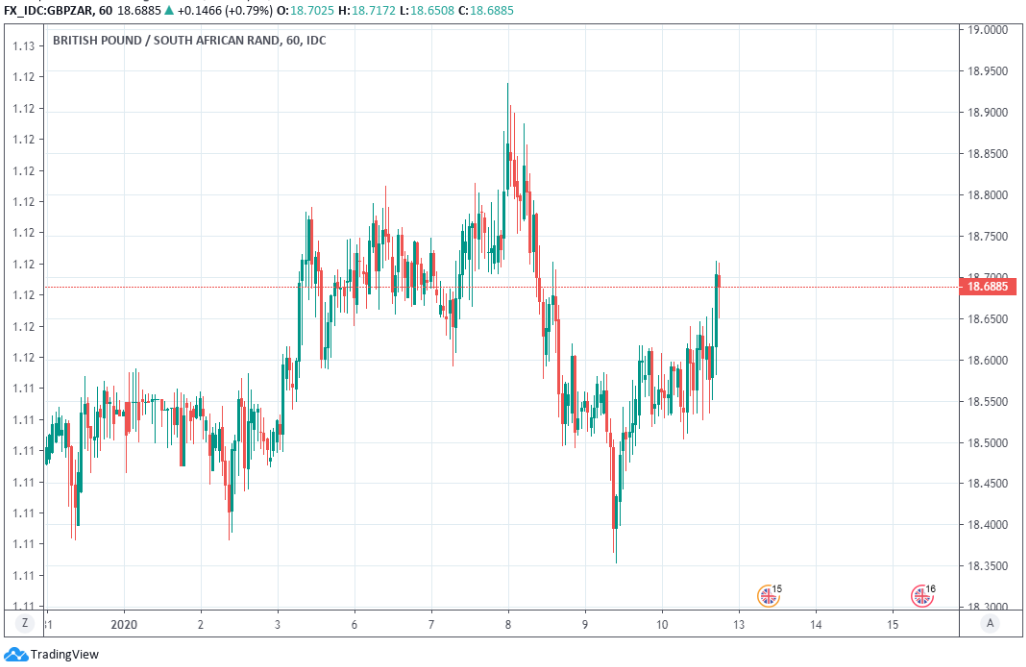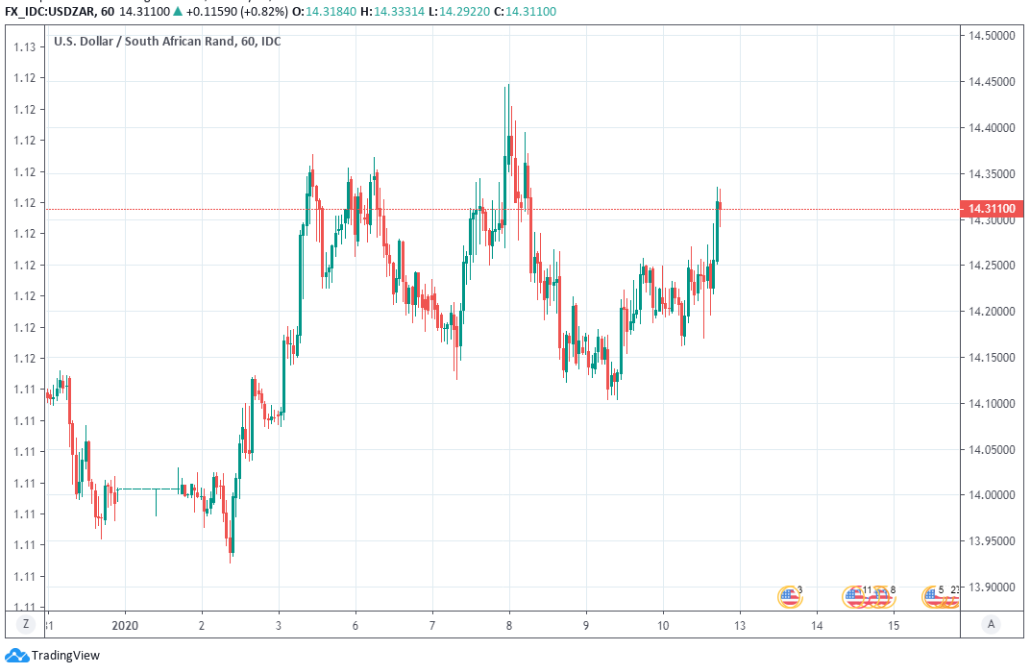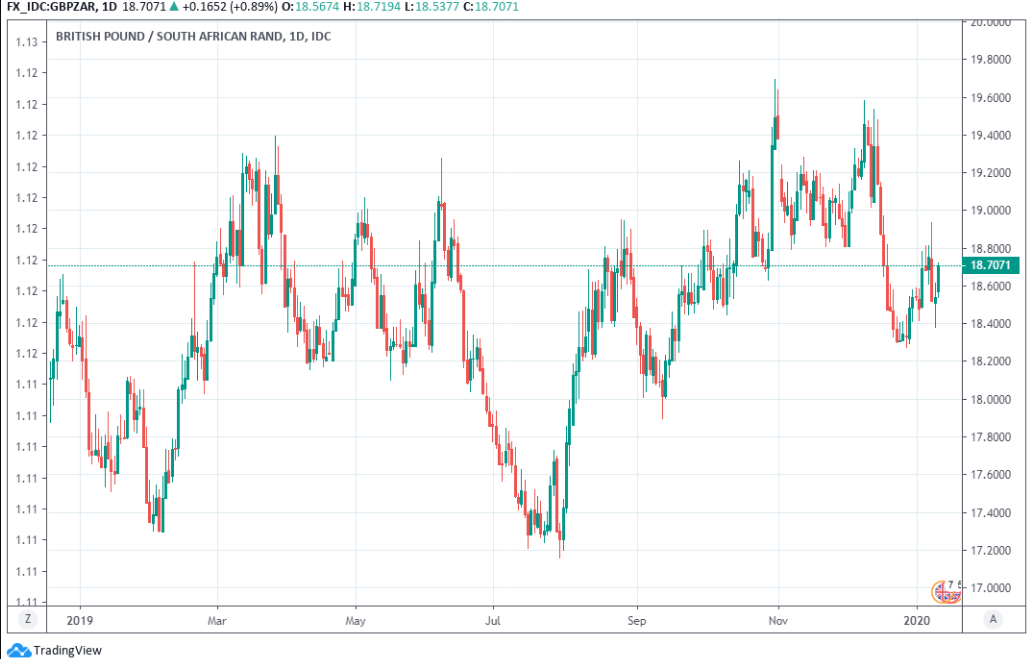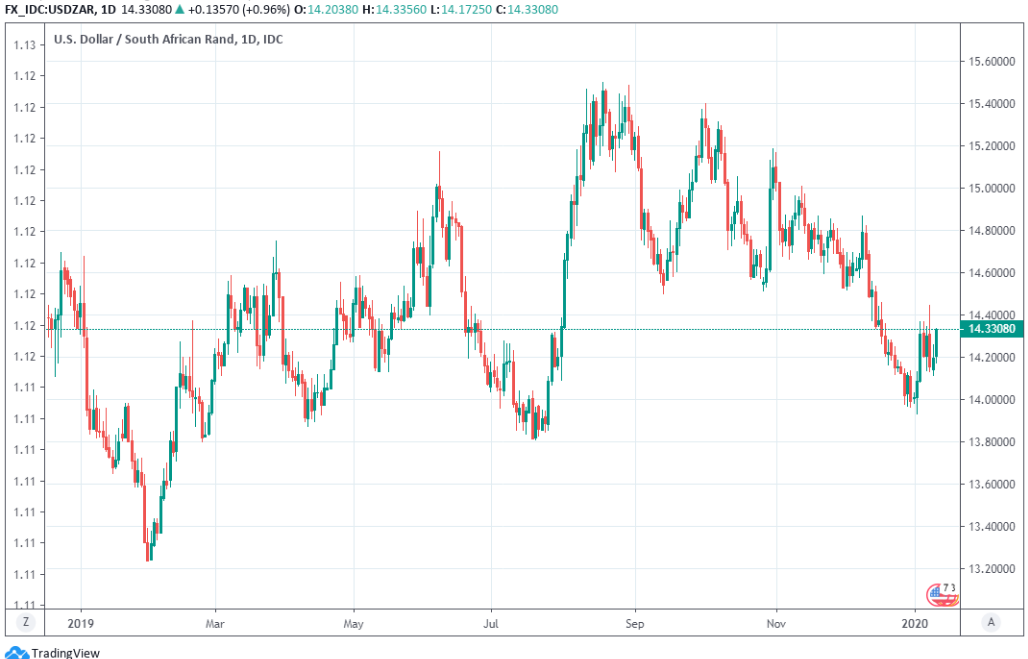The South African Rand Is Wounded after Eskom Chairman Quits amid Mounting Energy Woes
- Written by: James Skinner

Image © Eskom SOC, reproduced under CC licensing. Hendrina Power Station, Mpumalanga, South Africa.
- ZAR crumbles after Eskom chairman's resignation.
- Chair was unable to deliver on pledge to government.
- Had promised no load-shedding between Dec 17- Jan 13.
- But rolling blackouts have set new precedents this week.
- Eskom to stumble on ahead of budget, Moody's decision.
The Rand was pilloried late Friday when President Cyril Ramaphosa said he had accepted the resignation of Jabu Mabuza, Chairman of the ailing power utility Eskom, prompting a knee-jerk dive lower by the South African currency.
Eskom Chairman Jabu Mabuza is out after having accepted responsibility for the company's failure to deliver on a key pledge made in December, which was taken and repeated at face value by the President only for fresh load-shedding to embarrass the nation's leader and threaten the company as well as economy within days. He has now resigned his position.
President Ramaphosa had cut short a working visit to Egypt in December to address then-unprecedented load-shedding at the national electricity monopoly after Eskom claimed it may have been the victim of sabotage. The company pledged no further self-imposed power cuts between December 17 and January 13 after having presented the President with a plan to keep South Africa's lights on without interruption through the festive period.
"Mr Mabuza apologised for Eskom’s inability to meet the commitment it made to the President," the President's office says. "Government continues to support the measures being taken by Eskom to restore reliable electricity supply as a matter of priority, and is proceeding with measures to introduce new generation capacity – including self-generation – in the shortest possible time."
Above: Pound-to-Rand rate shown at hourly intervals.
Jabu Mabuza had been acting CEO until Monday when former Ampak boss André de Ruyter took up his seat as head of the embattled company, which has seen underinvestment and poor maintenance sideline a substantial part of its generating capacity. That's left it, the power supply and the economy vulnerable to breakdowns of equipment like that seen at the Medupi power station where a broken conveyor is said to have triggered January's outages.
The Rand slumped against the Pound and Dollar late Friday perhaps because markets have adopted the view that Mabuza's resignation is indicative of bigger and unheard of problems being in the pipeline. But the resignation and resulting statements could simply be the government seeking to protect its own credibility and restore some semblance of trust in Eskom - not to mention the government's handling of the crisis.
That might mean Friday's move could be susceptible to reversal early in the new week, even if the Rand is still seen hitting a fresh record low later this year. However, Finance Minister Tito Mboweni vented apparent frustration over unstated obstacles to the reform process via Twitter Friday. And with February's budget drawing nearer by the day, such comments from a senior official could ensure investors remain uneasy with the Rand.
Structural Economic Reforms Inertia is frustrating. Let’s get on with it. Movement!! Many steps at a time!!
— Tito Mboweni (@tito_mboweni) January 10, 2020
"South Africa is at risk of seeing an economic growth rate of below 1.0% y/y this year as a number of structural problems remain unresolved. This comes after a growth rate of likely below 0.5% y/y in 2019, not least due to substantial, periodic losses of electricity supply," says Annabel Bishop, chief economist at Investec, in an earlier note to clients. "Moody’s is scheduled to deliver its country review on 27th March with the Budget in February. The ratings agency has already placed SA’s long-term sovereign debt on a negative outlook towards the end of last year, indicating that it plans to downgrade SA."
Above: USD/ZAR rate shown at hourly intervals.
Eskom said Sunday 04 that it was moving imminently from stage 4 load shedding to an unprecedented stage 6, after already shifting from stage 2 to stage 4 earlier in the day. That removed from the grid, a supply of electricity that's equivalent to around 30% of total daily demand at a time when the company is already unable to provide the economy with uninterrupted power each day. It's summer in South Africa at the moment.
Load-shedding sees rolling blackouts imposed upon the country's companies and households in order to prevent the grid from failing and it's become so severe in recent weeks that some local analysts have forecast an economic contraction for the final quarter. The economy shrank sharply in the first quarter of 2019 in part because of exactly that kind of catastrophe and has in recent times become vulnerable to contraction in the first quarter of each year even without such load-shedding.
If you cannot effect deep structural economic reforms, then game over! Stay as you are and you are down graded to Junck Status!! The consequences are dire. Your choice. Yep!! Askies!!
— Tito Mboweni (@tito_mboweni) January 10, 2020
Investec's Bishop told clients last week that disruptions to the nation's power supply now threaten to plunge the country into a three-quarter-long recession given that GDP growth was already negative in the third quarter of last year. That's bad news for all in South Africa including the currency, which has been tipped by others to briefly fall to a fresh record low in 2020 due to the anticipated loss of the country's top credit rating.
Cape Town-headquartered Citadel Wealth Management has said Moody's, the last major agency to have SA as an investment grade borrower, is "very likely in any case" to cut the rating to 'junk' in March. In other words, even if the government shows in its February budget, a credible plan to eliminate its budget deficit and halt an increase in the debt-to-GDP ratio the agency still might do away with the coveted 'investment grade' rating.
Above: Pound-to-Rand rate shown at daily intervals.
Losing the top credit rating would risk encouraging outflows of foreign capital from the country and could lead to a substantial depreciation of the Rand.
"It would not spell the end for the country: the dollar is likely to run out of steam over the course of 2020, and a trade deal would also lift global sentiment and offer some support to emerging markets. So, while the rand may touch R18/$, it is more likely to average R16/$ this year," says Maarten Ackerman, chief economist at Citadel, in a briefing of the firm's views for the year ahead.
What are critical Economic Strategic Reforms? Read the National Treasury now Government Document! Let us move Forward! Many Steps at the same Time!! Movement!! No time for procrastinating!!
— Tito Mboweni (@tito_mboweni) January 10, 2020
Finance Minister Mboweni slashed forecasts for South Africa's economy in October's interim update, raised projections for government spending and lifted estimates of national debt as a percentage of GDP. The deficit is now expected to hit 5.9% of GDP this year, up sharply from the 4.5% envisaged back in February, and is forecast to hit 6.5% in 2020. Meanwhile, debt-to-GDP is seen rising above 60% this year and hitting 70% before the end of 2022.
Raising tax revenues in a slowing or contracting economy is difficult if-not impossible and cutting any government spending by a meaningful amount is also difficult to do without damaging 'the economy' - which is simply the sum total of all spending within a given area. South Africa's economy has done nothing but slow or contract since the last Moody's decision and those contractions automatically lift the debt-to-gdp ratio - almost by definition.
Adding insult to injury, the government is on the hook for Rs450 bn of Eskom's debt and is regularly called upon for handouts because the company is so indebted that it struggles to produce the revenue it needs to meet its obligation. It's unable to borrow from the market without government guarantees.
Above: USD/ZAR rate shown at daily intervals.
Time to move your money? The Global Reach Best Exchange Rate Guarantee offers you competitive rates and maximises your currency transfer. Global Reach can offer great rates, tailored transfers, and market insight to help you choose the best times for you to trade. Speaking to a currency specialist helps you to capitalise on positive market shifts and make the most of your money. Find out more here.
* Advertisement









